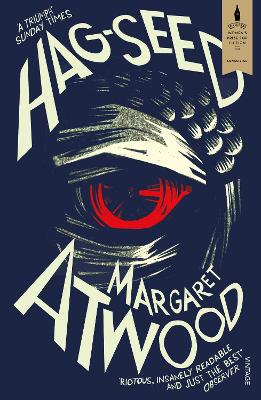Reviewed by clementine on
This felt very unlike the Margaret Atwood novels I've read before, not the least because she usually writes first person narratives with female protagonists. But one thing I've learned about her is that she dabbles in everything and she does it with finesse.
The main issue I have with Hag-Seed is that parts of it just felt like reading a lecture on The Tempest. Which, you know, I took an entire class on Shakespeare in my undergrad, so that's enough of that. The climax also comes a bit early, with a fair amount of time at the end devoted to more analysis of the play. But that's minor - the book is fast-paced, with short chapters, so even the more tedious parts were perfectly bearable.
Overall, I really enjoyed the framing of this book. The characters weren't super well-developed, but that feels in line with characterization in plays anyway. The choice to set Hag-Seed primarily in a prison was fascinating - not just because it's an obvious reflection of the major themes of the play (made explicit in the novel itself), but because it's a pretty clear political statement about the importance of literacy and theatre in prisons. Atwood is known for her left-wing politics so this type of compassionate view of the rights of prisoners is right in line with that. It didn't feel heavy-handed or preachy though, probably because it integrated perfectly with the plot.
With my knowledge of The Tempest I had a really good time picking up on plot and character parallels. Some of the names were genius. I especially loved Felix/Prospero - different name, same meaning. When I realized that Estelle was Felix's "auspicious star" I was delighted.
Most of the other Atwood novels (and short stories) I've read have been explicitly framed as feminist (or perhaps post-feminist, in the case of Cat's Eye.) That was not a major theme in this book, which I found interesting. In fact, there was a dearth of female characters. But Anne-Marie was physically and emotionally strong and did challenge Felix's paternalistic tendencies as well as the prisoners' view of the inevitability of Miranda's rape, so Atwood definitely got her little feminist jabs in. Which, of course, I appreciate.
A really interesting and unusual retelling, I think - not without its faults, but enjoyable nonetheless.
Reading updates
- Started reading
- 5 February, 2018: Finished reading
- 5 February, 2018: Reviewed
